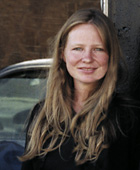Samantha Hunt is most recently the author of The Invention of Everything Else.

Listen: Play in new window | Download (Running Time: 51:15 — 46.9MB)
Condition of Mr. Segundo: Pining for chambermaids.
Author: Samantha Hunt
Subjects Discussed: Managing multiple perspectives, working within the limitations of 1943, helpful historical endnotes, Tesla’s tendency to divide things by three, pleasantly misleading metafictional names, using abandoned New York topography in a novel, the Hotel New Yorker’s Protecto-Ray, the time before the Internet vs. the time before electricity, the ethical implications of radio, the early innocence of radio, exuberance and new technology, electricity blackouts, crackpot science, time machines, Tesla as the last of the great individual inventors, why the world ignores geeks, the commercialization of science, the sordid relationship between Tesla and Westinghouse, how society accepts people talking to pigeons and Martians in 1943 vs. 2008, wonder misconstrued as simple-mindedness, childlike adults, the asexual nature of wonder, Philip K. Dick and science fiction, salvation in death, war and rationing, the questionable stature of Thomas Edison, Robert & Katharine Johnson, responding to a bizarre review, learning lots of science, Against the Day, The Devil in the White City, Sebald and image, and autodidacts.
EXCERPT FROM SHOW:
Correspondent: I also wanted to ask you about the rivalry with Edison.
Hunt: Yeah.
Correspondent: For AC power. I’m wondering. Tesla himself says that he doesn’t much care. He’s not jealous. He’s not envious in any particular way. And I’m certain that that probably came from Tesla. But I’m also wondering if this was a way for you to inure your own possible judgment. Because surely, if you’re reading twenty — forty — books on Tesla, you’re probably going to be rooting for him in some sense against the evil Edison.
Hunt: Sure.
Correspondent: And so I’m wondering what you did to keep your own subjective judgments at bay in relation to the Westinghouse-Tesla-Edison contretemps.
Hunt: It’s tempting to not completely skewer them, of course. Because they’ve been so…
Correspondent: It’s the easy thing to do.
Hunt: Yeah. Well, they’ve been on a pedestal for so very, very long. And I was taught both of them in school. But I was never taught Tesla. But then, you know, ultimately, they had a lot of the same fever that Tesla had. And I admire that. And I think — at the end, I try to really come down sympathetically on Edison. Because I do feel that, after he was gone — I mean, there’s a lot to miss there too. Even though he was really such a great marketer, and maybe not such a great inventor, and really stole a lot of people’s ideas.
Correspondent: And worked inventors to death too.
Hunt: Worked inventors to death. Drove them crazy. I still miss his type around here. And so I have Tesla missing him just a little bit at the end. And it’s more just a sadness for a past time, I guess. During the 1880s and the 1890s, oh, how exciting to be in New York! And to be like, “Okay! Let’s wire the whole city for electricity!” And I don’t know. I had a lot of nostalgia for that time, I think. And so even Edison — at the end of the book, I had to kind of force myself to come to terms with him. And to feel some sort of admiration and respect for him.
Correspondent: So it seems that there are two types you miss. One is the kind of independent inventor along the lines of Tesla. And the other is the kind of corporate, we’re going to go ahead and completely dominate.
Hunt: You know what it is? It’s kind of how people hang up old Coca-Cola ads in their house. And they’re like, “Oh! Look at those beautiful old Coca-Cola ads!”
Correspondent: Which is disturbing on some level!
Hunt: It’s totally disturbing! And yet, it evokes some sort of nostalgia. I guess that’s how I feel about Edison. He’s kind of like one of those old Coca-Cola ads.
Correspondent: It’s the safer nostalgia then.
Hunt: Yeah.
Listen: Play in new window | Download (Running Time: 51:15 — 46.9MB)
1 Comment